Electric car start-up Faraday Future picks Nevada over California to build a $1-billion plant

Headquarters of Faraday Future, an electric car startup based in Gardena.
- Share via
Gardena electric car start-up Faraday Future announced Thursday that it will build a $1-billion production plant in Nevada, a major move for an upstart rival to Tesla Motors.
The expansion comes on the heels of one from Tesla, which last year announced plans to build a $5-billion battery factory outside Reno. The state offered one of the largest incentive packages ever given by a state — $1.3 billion in tax abatements and other perks — to lure the Palo Alto electric car maker.
Faraday Future, which is backed in part by a Chinese media billionaire but has yet to build a car, was considering four states, including California, for the production facility. The final selection was influenced in part by a $335-million package of tax incentives and infrastructure investments offered by Nevada Gov. Brian Sandoval, company representatives said.
Dag Reckhorn, Faraday Future’s vice president of global manufacturing, said the incentives from Nevada were an “important piece” of the decision but not the only factor. He said Nevada was also appealing because of the ample land needed to accommodate the plant, and it was close enough to Southern California seaports.
“Nevada gave us the best overall deal,” said Reckhorn, a former director of manufacturing for Tesla’s Model S. “It’s still close to the West Coast, we have Highway 15. It’s good for our supply chain — getting parts in and out of the plant.”
Faraday Future had been exploring sites in Nevada, California, Georgia and Louisiana. Company officials declined to say whether California offered similar incentives or where they were considering building, citing a nondisclosure agreement. A spokesman for Gov. Jerry Brown’s Office of Business and Economic Development declined to comment.
Along with Reckhorn, Faraday Future is run by a team of engineers and executives who hail from senior positions at Tesla and other luxury car companies, including BMW, Porsche and Volvo. One of the founders and major backers of the company is Jia Yueting, the chairman and founder of Leshi Internet Information & Technology, or LeTV, a major Chinese media company.
According to Forbes, he has a net worth of $7.9 billion and is China’s 17th-richest person. In a letter to Nevada lawmakers, Jia said he is personally backing Faraday Future, but there is also a “diverse funding strategy” for the company.
He said the company seeks to revolutionize the auto industry by “creating an integrated, intelligent mobility system that protects the earth and improves the living environment of mankind.”
The company will break ground on the Nevada factory within the first three months of 2016, Reckhorn said. He declined to say when the company expects to launch its first vehicles.
As a newcomer to electric vehicles, Faraday will be entering an unproven market that has still not been mastered by Tesla, which unveiled its first electric vehicle nearly a decade ago.
More established automakers such as Chevrolet, Nissan, Ford and Volkswagen are also racing to grab shares of the electric vehicle market.
That could make it even more difficult for an unknown brand such as Faraday to make a dent, experts said.
“Suddenly, this space has become a little bit crowded,” said Jessica Caldwell, a senior analyst at Edmunds.com.
Compounding the challenges for Faraday and others in the electric car business is the continued drop in gasoline prices, which on average have fallen to about $2 a gallon for regular nationally and $2.77 in California.
Unlike in 2008, when gas prices soared, Caldwell said consumers are returning to larger sport utility vehicles.
“During the gas price shock of 2008, everyone was dying to get out of their larger cars,” Caldwell said. “Now people are kind of free to choose what they want.”
The market share for electric vehicles has dropped from a high of 3.7% in 2013 to 2.8% today, according to Edmunds.com.
Stacy Morris, a Faraday spokeswoman, said the company is looking at a series of side businesses, including self-driving vehicles and mobile technology applications, that will make driving less of a chore.
“Right now, it feels like everyone is driving around in a cellphone, and everyone should be driving around in a mobile device,” Morris said. “You still feel like it’s dead time, where you’re not fully connected.”
Thilo Koslowski, vice president and automotive practice leader at Gartner, said Faraday is tapping into the market for “digital lifestyle convergence.”
“People are increasingly expecting to be connected wherever they are,” he said. “For driving, that is obviously unsafe, and not a great experience right now. That’s where you will see a lot of innovation going forward.”
And in some ways, Faraday will be piggybacking off the work Tesla has already done: navigating an industry filled with established incumbents, Koslowski said.
“That’s a pretty big chunk that comes off their plate,” he said.
Nevada’s incentive package for Faraday is about a quarter the size of the one given to Tesla Motors last year.
The $335-million package includes $216 million in tax credits and other tax abatements, and $119 million in infrastructure improvements in North Las Vegas.
The legislation for the tax incentives has not yet been filed, but the Legislature will soon be called into a special session to consider the package, said Jennifer Cooper, a spokeswoman for the Nevada Governor’s Office of Economic Development.
She said the state is “confident in the business model” for Faraday, but that the company will not receive all the tax abatements until it has invested $1 billion.
More to Read
Inside the business of entertainment
The Wide Shot brings you news, analysis and insights on everything from streaming wars to production — and what it all means for the future.
You may occasionally receive promotional content from the Los Angeles Times.












